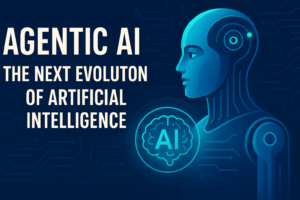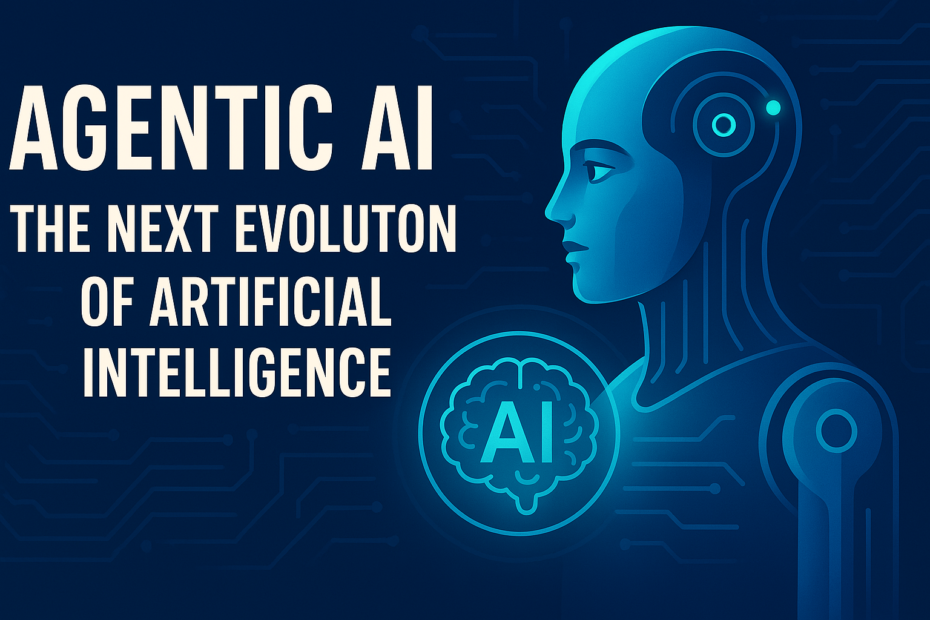
Artificial intelligence (AI) has growned from doing advanced tasks to using it in day to day life —voice assistants, recommendation in different applications and websites, chatbots, and self-driving cars. But now, we’re entering a new phase in AI’s evolution: Agentic AI.
The Agentic AI is a step ahead then the old AI. The old AI gives reply based on the prompt or input but the Agentic AI works autonomously by executing plans that has multiple step to achieve user-defined goal. It’s not just answering questions — it’s making decisions, adapting to feedback, and operating with a level of independence that feels eerily human.
In this article, we’ll see :
- What is Agentic AI ?
- How the Agentic AI works ?
- What is the use of Agentic AI ?
- What is the future of Agentic AI ?
- We’ll also have a look to its merits, challenges, and ethical implications to get a balanced picture of this rapidly emerging tech frontier.
What is Agentic AI?
Agentic AI refers to AI systems that function as autonomous agents. Instead of executing single, isolated tasks (like generating a reply to a prompt), these agents can plan, make decisions, and orchestrate a series of actions over time to accomplish complex objectives.
Some features of Agentic AI are as follows :
- Autonomy: uman intereference is not needed again and again for giving input or prompt.
- Goal-oriented behavior: It analyses the objective given by user and finds different solution and ways to achieve it.
- Contextual awareness: It analyses the environment and adapts easily.
- Memory and learning: It saves the past works and uses it to to give more efficient answers I future.
Think of it like this: If traditional AI is like a calculator, Agentic AI is like a personal assistant that not only schedules your meetings but also books your flights, orders lunch, adjusts plans if your flight is delayed, and sends updates — all without being micromanaged.
How Does Agentic AI Work?
At its core, Agentic AI is built using the same foundation as generative AI models (like ChatGPT, Claude, or Gemini), but with a new layer of agency — planning, reasoning, and acting.
Here’s a simplified overview of how it operates:
- Goal Setting: The user defines a goal (e.g., “Plan my company’s product launch”).
- Planning: The AI decomposes the goal into subtasks (e.g., market research, event planning, email campaign).
- Tool Use: It uses external tools (e.g., calendars, APIs, databases) to execute tasks.
- Monitoring: It monitors progress, checks for errors, and adjusts the plan as needed.
- Feedback Loop: The agent learns from results and user feedback to improve.
Frameworks like Auto-GPT, BabyAGI, and OpenAI’s Assistants API are early implementations of agentic principles. They chain multiple prompts and actions together, creating self-directed workflows that can run for hours or even days.
Real-World Applications of Agentic AI
Agentic AI is being explored across industries — and in many cases, it’s already making an impact:
- Business Operations Automation
- AI agents can handle repetitive workflows such as invoice processing, report generation, and CRM updates.
- Companies are using them for internal project management, resource allocation, and performance tracking.
- Customer Support
- Advanced AI agents can handle entire support conversations, escalate issues when needed, and even follow up with customers over time — acting more like human representatives than static chatbots.
- Software Development
- Dev agents can write, test, debug, and deploy code with minimal human oversight.
- They can even manage version control systems like Git and handle documentation.
- Marketing and Sales
- From running multi-channel ad campaigns to managing social media calendars and writing SEO-friendly content, agentic systems are becoming virtual marketers.
- Education
- Personalized tutoring systems that adapt in real time to a student’s learning pace and style.
- Agents can assign homework, track progress, and provide targeted explanations or feedback.
- Healthcare
- Virtual medical assistants that manage patient intake, track treatment plans, and even monitor symptoms via wearable integration.
- AI agents may also assist in clinical trial management or health insurance processing.
Merits of Agentic AI
So why is everyone so excited about this technology? Here are the standout advantages:
- Massive Efficiency Gains
Tasks that once took teams of people days to complete can be executed in hours, thanks to autonomous decision-making and automation.
- Scalability
Agentic AI doesn’t need breaks, doesn’t get sick, and can operate 24/7. One agent can manage dozens of processes simultaneously.
- Cost Reduction
Reduced need for manual oversight and labor translates to lower operational costs in the long run.
- Personalization
Agentic systems can learn from ongoing interactions, offering increasingly personalized experiences to users.
- Interoperability
Agents can be programmed to interact with APIs, software tools, and devices, acting as digital glue between fragmented systems.
Challenges and Demerits of Agentic AI
However, with great power comes… you guessed it — some serious concerns.
- Lack of Reliability
Autonomous agents can make mistakes, get stuck in loops, or misinterpret goals — especially in ambiguous contexts.
- Security Risks
Because agents can take action autonomously (e.g., sending emails, making purchases), they pose a greater risk if hijacked or misconfigured.
- Loss of Human Oversight
Too much reliance on agentic systems can reduce human involvement in critical decision-making — potentially leading to undesirable outcomes.
- Ethical Concerns
Who’s responsible if an AI agent causes harm? How do we ensure these agents align with human values? These questions remain largely unanswered.
- Bias Amplification
If the underlying models are biased (which many are), agentic systems might scale those biases faster and wider than ever.
Agentic AI vs Traditional AI: What’s the Difference?
| Feature | Traditional AI | Agentic AI |
| Input Type | Prompt or task-based | Goal or objective-based |
| Execution | Single-step | Multi-step, autonomous |
| Context Awareness | Limited | Adaptive and persistent |
| Human Supervision | High | Minimal (sometimes none) |
| Applications | Narrow | Broad, evolving workflows |
What the Future Holds
We’re still in the early innings of Agentic AI — but its trajectory suggests it will reshape the future of work. Soon, you might have:
- A personal AI that runs your business operations while you sleep.
- A digital research assistant that reads, summarizes, and presents key findings daily.
- A full-stack dev agent that builds and maintains your website with minimal input.
Companies like OpenAI, Google DeepMind, and Anthropic are racing to build increasingly powerful agent frameworks. Meanwhile, startups are creating domain-specific agents for law, design, e-commerce, and even agriculture.
There’s also growing interest in multi-agent systems, where swarms of specialized AI agents collaborate to solve problems collectively — just like human teams.
Conclusion: The Rise of Digital Autonomy
Agentic AI is not just another incremental improvement in artificial intelligence — it’s a paradigm shift.
By enabling machines to act independently, reason contextually, and pursue goals without human micromanagement, we’re unlocking a new era of productivity, creativity, and innovation. But with that power comes responsibility — to build guardrails, develop ethical frameworks, and stay vigilant about unintended consequences.
